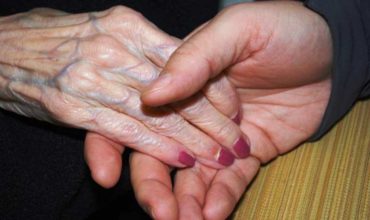Approximately 10 million individuals are caring for a person with Alzheimer’s Disease (AD) or another dementia. Although memory loss is the most common symptom, others include confusion, lack of orientation and changes in personality and behavior. Individuals with AD require escalating levels of care, management and provisions for their safety. Because the disease slowly gets worse, caregivers often spend a long time in the caregiving role.
As a matter of fact a recent survey found that 25% of those caring for someone with Alzheimer’s provide 40 hours of weekly care with about 75% performing physically demanding kinds of personal care that include bathing, feeding and bathroom assistance. Understandably, 40% of these caregivers reported high levels of emotional stress, particularly those who are working full or part-time; last year two-thirds of working caregivers missed work because of caregiving responsibilities and 8% turned down promotions. It has been estimated that unpaid Alzhimer’s Disease caregivers provide an economic asset to our society worth almost $83 billion.
To support these caregivers, the Alzheimer’s Research Foundation offers
caregivers assistance through education, services, research and advocacy programs; such programs are at local, state and national levels. There is also funding available to assist family caregivers under the National Family Caregiver Support Program (NFCSP). The Alzheimer’s Foundation of America offers these tips for success as you give the best care possible for a loved one with Alzheimers.
Caregiving Tips: Strategies for Success
- Educate yourself about the disease. Read books, attend workshops and consult with healthcare professionals.
- Learn caregiving techniques. Key areas are communication skills, safety concerns, and managing behavioral challenges and activities of daily living.
- Understand the experience of your loved one. Adjust your expectations. Be patient and kind.
- Avoid caregiver burnout. Make time for yourself. Join caregiver support groups. Pursue interests beyond your caregiving role, such as exercise, hobbies, journaling and art.
- Maintain your own physical and mental health. Exercise, respite and other activities can reduce stress. Seek medical help if there are signs of depression.
- Discuss the situation with family and friends. Support systems are critical.
- Do cognitive stimulation activities with your loved one. Listening to music, word puzzles and memory games can easily be done at home.
- Foster communication with physicians. Be involved in your loved one’s medical care. Ask questions about the progression of the disease, express concerns and discuss treatment options.
- Take care of financial, legal and long-term care planning issues. Try to involve your loved one in decision-making, if they are still capable of providing input, and consider their wishes related to future care and end-of-life issues.
- Smile. Kindness, humor and creativity are essential parts of caregiving. Hugs, hand massage and other gentle physical contact will help your loved one feel connected and loved.
- Think positive. Focus on your loved one’s remaining strengths and enjoy your relationship while you are still able to.
Sources:
National Family Caregiver Support Program
(800) 877-8339
www.aoa.gov
Alzheimer’s Research Foundation
(877) 427-0220
www.alzheimers-research.org
Alzheimer’s Foundation of America
866.AFA.8484
www.alzfdn.org





